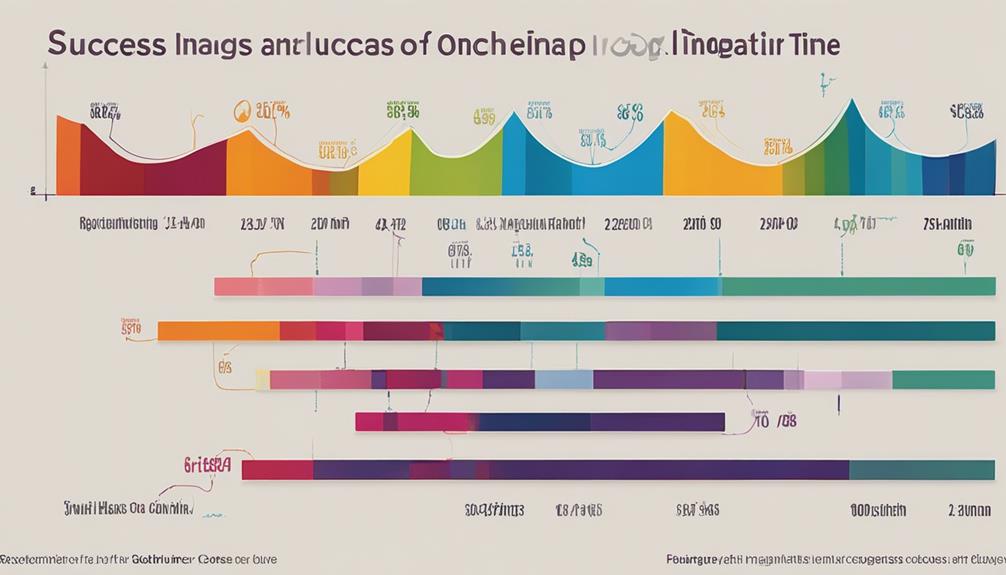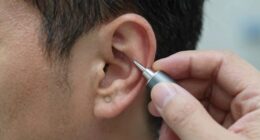When it comes to enhancing the communication skills of children with cochlear implants, there are those who think it’s as easy as flipping a switch and voila!
Well, the reality is a bit more nuanced. From navigating the complexities of sound processing to honing in on effective communication strategies, the journey is one of continuous exploration and adaptation.
But fear not, as we uncover the intricate web of tools and techniques that contribute to the success of these young communicators, you'll find yourself intrigued by the intricate dance of technology and human connection at play in this fascinating realm.
Key Takeaways
- Timely intervention and parental support are crucial for children with cochlear implants.
- Early identification of hearing loss and language therapy are essential for communication development.
- Visual aids, joint focus, and attention to sounds enhance language skills.
- Consistent language input, tailored intervention, and maternal responsiveness positively impact communication outcomes.
Benefits of Cochlear Implants in Communication
When considering the benefits of cochlear implants in communication for profoundly deaf children, parents are integral in the decision-making process both before and after implantation. The journey of cochlear implantation is a significant one for children, as it opens up new possibilities for oral communication and language development. The role of parents in this process is crucial, as they're the primary advocates and decision-makers for their children. By opting for cochlear implantation, parents pave the way for enhanced communication skills that greatly improve the quality of life for their children and families.
Post-cochlear implantation, the focus shifts towards developing oral communication skills. Through dedicated therapy and support, children can harness the full potential of their cochlear implants, enabling them to engage more fully with the world around them. The decision-making process surrounding cochlear implantation, especially in cases where bilateral implants are considered, requires careful considerations and consultations with healthcare professionals. Ultimately, the benefits of cochlear implants in communication are vast, offering children a pathway to improved language development and enriched interactions with their environment.
Early Intervention for Improved Communication

Early intervention programs play a pivotal role in enhancing communication outcomes for children who've received cochlear implants. When it comes to improving communication in young implant recipients, early intervention is key.
Here are some essential points to consider:
- Timely Intervention: Early identification of hearing loss and prompt cochlear implantation pave the way for children to catch up with their peers in language skills.
- Parent Training: Programs like the It Takes Two to Talk model focus on equipping parents with the skills to support their child's language development effectively. Responsive parenting plays a crucial role in fostering communication abilities.
- Therapeutic Strategies: Incorporating auditory training exercises and speech therapy techniques tailored to the needs of deaf children aids in enhancing their language skills. These interventions are instrumental in facilitating effective communication development in cochlear implant recipients.
Challenges Faced by Young Implant Recipients
Facing the challenges of developing language skills due to hearing loss, young cochlear implant recipients encounter hurdles in adapting to processing sounds through their implants. Communication difficulties such as delays in speech and language development compared to their hearing peers can be overwhelming. Early intervention and consistent language therapy are crucial in helping these deaf children with cochlear implants navigate their communication skills. Support from parents, educators, and speech therapists plays a vital role in the successful communication development of cochlear implant users. By providing the necessary tools and resources, such as auditory-verbal therapy and vocabulary development exercises, these children can enhance their speech and language abilities, bridging the gap with their hearing counterparts. Here is a table summarizing the challenges faced by young implant recipients:
| Challenges | Description | Solutions |
|---|---|---|
| Delayed language skills | Difficulty in speech and language development compared to hearing peers. | Early intervention |
| Processing sound | Adapting to hearing and processing sounds through the cochlear implant. | Auditory-verbal therapy |
| Vocabulary development | Struggles in expanding vocabulary due to limited exposure to spoken language. | Language intervention |
Strategies for Supporting Children's Communication

To effectively support children with cochlear implants in their communication development, utilizing visual aids and gestures can significantly enhance their understanding and interaction. When engaging with children with cochlear implants, it's crucial to create a well-lit environment with minimal background noise to ensure clear communication.
Encouraging joint focus and exploration can support language development by fostering a collaborative learning environment. Additionally, responding and following the child's focus can help in engaging them effectively during communication sessions. Bringing attention to sounds and words is essential for promoting language development in children with cochlear implants.
Enhancing Language, Social, and Academic Skills
Let's explore practical strategies that can enhance the language, social, and academic skills of children with cochlear implants. Early cochlear implantation is key in facilitating language development, allowing deaf children to bridge the gap in communication skills with their peers.
Parents play a vital role in this process by providing consistent language input, fostering joint focus, and encouraging exploration to boost language development. Tailored language intervention programs and auditory training exercises tailored to individual needs have shown significant improvements in language abilities for cochlear implant recipients.
Effective parent training programs, like the It Takes Two to Talk model, can elevate interaction quality and language skills in these children. Maternal responsiveness and parental involvement are crucial factors positively influencing language milestones and vocabulary development in children with cochlear implants, underscoring the significance of early intervention and support for their overall academic and social success.
Frequently Asked Questions
How Do Cochlear Implants Improve Communication?
Cochlear implants improve communication by converting sounds into electrical impulses for the auditory nerve to process. They enable recipients to perceive sound, aiding in speech and language development. Clear speech and visual cues further enhance understanding.
Early implantation helps children catch up in language skills. Structured activities and practice refine speech and listening abilities. Auditory Verbal Therapy fosters sound awareness, utilizing the child's environment for learning.
How Do You Train Speech After Cochlear Implant?
After receiving a cochlear implant, speech training involves auditory-verbal therapy to develop listening and spoken language skills. Techniques like discrimination tasks, closed set activities, and simple sentence practice are used to enhance speech perception.
Visual cues, gestures, and repetition help reinforce speech sounds for better communication. Regular practice and exposure to various sounds and language stimuli contribute to post-implantation speech development.
Tailored speech therapy programs focus on individual needs to enhance speech clarity and understanding.
Can Kids With Cochlear Implants Talk?
Yes, kids with cochlear implants can talk. Cochlear implants help in processing sounds, aiding speech and language development.
Early intervention and speech therapy are crucial for effective communication. Many children with implants achieve language milestones and engage in verbal communication.
Consistent support and therapy play a significant role in their success. With effort and assistance, kids with cochlear implants can develop spoken language skills comparable to their hearing peers.
How to Communicate With Someone Who Has a Cochlear Implant?
When communicating with someone who has a cochlear implant, it's essential to face them directly for better visual cues. Speaking clearly and at a moderate pace helps with lip-reading and understanding. Utilizing gestures, signs, or visual aids can enhance comprehension.
Ensure the environment is well-lit and free of excessive background noise for clearer communication. Adapting communication strategies at home and school is crucial in supporting individuals with cochlear implants.
Conclusion
In conclusion, cochlear implants offer immense benefits for children's communication skills. Early intervention is crucial for optimal outcomes, despite the challenges young recipients may face.
By implementing strategies like clear speech and auditory verbal therapy, we can support their language development effectively. Remember, Rome wasn't built in a day, so patience and persistence are key in helping these children thrive in their communication journey.











